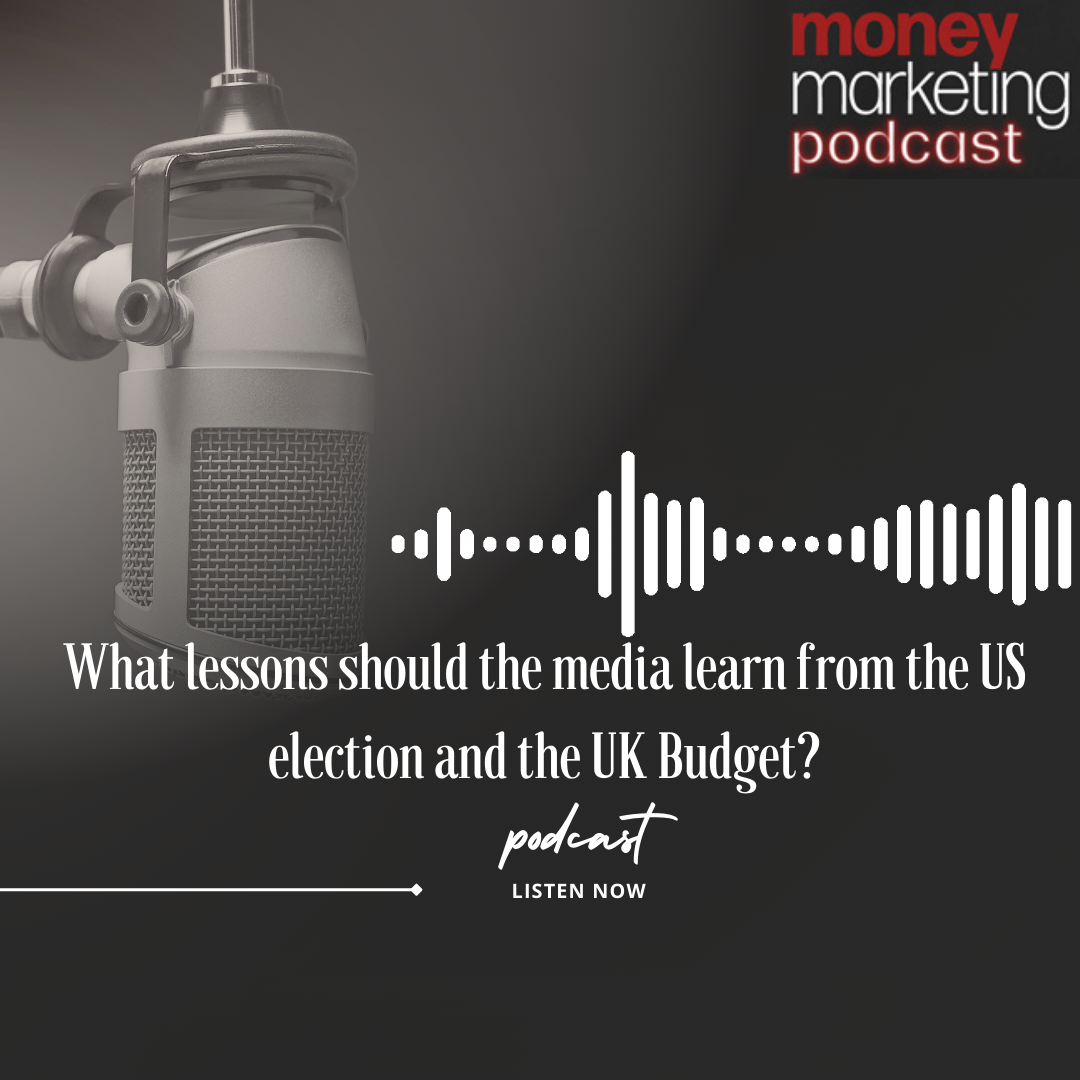Money
Money Marketing Weekly Wrap-Up – 04 Nov to 08 Nov


Money Marketing’s Weekly Must-Reads: Top 10 Stories
This week, Tony Wickenden explores tax planning strategies in the wake of the recent Budget, and Mattioli Woods expands with its acquisition of Stockport-based Cullen Wealth. Discover more highlights below:
Tony Wickenden: Tax planning in the wake of the Budget
Mattioli Woods acquires Stockport-based Cullen Wealth
Mattioli Woods has acquired Stockport-based Cullen Wealth, enhancing its presence in the Northwest and strengthening its wealth management and employee benefits services. This acquisition aligns with Mattioli Woods’ focus on serving mass affluent clients, business owners, professionals, and corporates. Deputy CEO Michael Wright praised Cullen Wealth’s dedication to client service, seeing the acquisition as a strategic fit for Mattioli Woods’ growth. Founder Richard Cullen expressed confidence that the partnership will drive innovation and expand offerings for their clients.
Rate of employer National Insurance contributions raised to 15%
In the Autumn Budget, Chancellor Rachel Reeves announced an increase in employer National Insurance contributions, raising the rate by 1.2 percentage points to 15% from April 2025. The secondary threshold will be lowered to £5,000, while the Employment Allowance will double to £10,500 to aid small businesses. These changes aim to generate £25 billion annually. Employers are advised to review their benefits and consider salary sacrifice schemes to offset rising NIC costs and better manage expenses.
Close Brothers and SEI sign platform tech deal
Close Brothers Asset Management (CBAM) has partnered with SEI to adopt the SEI Wealth Platform and SEI Data Cloud, aiming to strengthen its tech and data capabilities. This move supports CBAM’s strategic growth goals, enhancing services for wealth management professionals and clients. The partnership, chosen after a rigorous selection, also includes adopting Objectway’s Portfolio Management Solution and outsourcing order execution to Winterflood Business Services. SEI, which serves other major firms, welcomed CBAM’s commitment to integrated tech-driven expansion.
Reaction as Bank of England cuts base rate again
The Bank of England has cut the base rate by 0.25%, bringing it to 4.75%, with an 8:1 vote from its Monetary Policy Committee (MPC). Experts express mixed reactions, noting potential impacts on inflation and borrowing costs. Fidelity’s Ed Monk warns that while inflation is now below target, borrowing costs may not drop swiftly due to rising market interest rates. Hymans Robertson’s William Marshall and Hargreaves Lansdown’s Sarah Coles anticipate a cautious pace in future rate cuts due to inflation concerns.
Cover story: Trade Body 2.0 – Does the platform sector need a new voice?
Momodou Musa Touray, senior reporter, examines the need for a dedicated trade body for the platform sector in the UK with the newly launched Platforms Association. This group aims to unify the sector and address issues like regulatory compliance, platform requirements, and operational efficiencies. Despite support from several major platforms, the sector remains divided, with some preferring the UK Platform Group. The Platforms Association’s goal is to provide a unified voice, especially on regulatory matters, to support industry growth and stability.
Stamp duty on second homes rise to 5% from tomorrow
Chancellor Rachel Reeves announced a rise in the stamp duty surcharge on second homes and investment properties from 3% to 5%, effective from 31 October 2024. The move is part of the Autumn Budget, aiming to raise revenue while supporting first-time homebuyers. Industry responses include concerns from mortgage professionals about the impact on the buy-to-let market, with Zoopla’s Richard Donnell predicting reduced demand. ARLA Propertymark urges the government to support landlords amid the growing shortage of private rented homes.
Billy Burrows: New pensions IHT trap could fuel demand for annuities
The 2024 Budget introduces a significant change to pensions, as unused pensions and death benefits will be subject to inheritance tax (IHT) from April 2027. This could shift the trend away from pension drawdown, which has been favoured for passing wealth, towards annuities. Annuities, particularly joint-life ones, offer secure, guaranteed income, and may become more appealing for those seeking to reduce pension fund values and provide peace of mind to surviving partners, helping to solve the “annuity puzzle” of low demand despite their efficiency. William Burrows runs the Annuity Project and is a financial adviser at Eadon & Co.
Leader: The CII and the PFS are at it again. Will this feud ever end?
Lois Vallely reports on the ongoing feud between the Chartered Insurance Institute (CII) and the Personal Finance Society (PFS), which continues to stir controversy. Recently, the CII appointed several of its executives to the PFS board, raising questions about governance and transparency. This move follows a long history of attempts by the CII to exert control over the PFS and its member funds, leading some to call for the PFS to separate or form an independent body.
Rachel Reeves announces 40% relief on business rates
Chancellor Rachel Reeves has announced a 40% business rates relief for the retail, hospitality, and leisure industries in 2025/26, capped at £110,000 per business. This is a reduction from the current 75% discount, which will expire in April 2025. The British Retail Consortium had called for a 20% cut, highlighting the sector’s disproportionate business tax burden. However, local councils depend heavily on business rates revenue, raising concerns about alternative funding to maintain local services. The relief is seen as a positive but insufficient solution.
Money
Podcast: What lessons should the media learn from the US election and the UK Budget?


In this week’s Weekend Essay, editor Tom Browne reflects on what lessons the media can learn from the US election results and the UK Budget.
From over-sensationalising political outcomes to the dangers of guessing in the absence of solid policies, Tom discusses how a more informed, sober approach is needed in today’s media landscape. Should the media focus less on polarisation and more on understanding voter behaviour?
Money
Cheapest places to buy Christmas tubs this week including Quality Street, Cadbury Heroes and Celebrations

CHRISTMAS is just around the corner and if you’re looking to stock up on Christmas chocolate tubs we’ve checked out the best offers around.
Everyone loves a sweet treat during the festive season and whether your preference is for Cadbury Heroes, Celebrations or a classic tub of Quality Street these are the cheapest prices.
If you’re partial to a tub of Quality Street, both Aldi and Lidl are selling 600g tubs for £4.49 – making them the cheapest out there.
In comparison Sainsbury’s and Tesco are selling the chocolates for £4.50 for Nectar and Clubcard holders, while Asda has priced them at £6 individually, or £9 for two.
Morrisons is also pricing the tubs at £6, while Ocado is charging £5.
Quality Street was launched in 1936 and has been a favourite with families since.
The selection includes ‘the purple one’ which brings together hazelnut and caramel, the toffee finger, orange chocolate crunch, strawberry delight and ‘the green triangle’.
Cadbury Heroes lovers can also pick up 550g tubs for £4.50 from Sainsbury’s and Tesco if they are Nectar or Clubcard members.
Asda has Heroes tubs included in its two for £9 deal, meaning if you’re happy to double up you can pick them up at the supermarket for the same price as Tesco and Sainsbury’s shoppers.
Meanwhile, Aldi is selling the tubs for £4.99 and Morrisons for £6.
The Heroes selection includes Cadbury Dairy Milk, Twirl and Crunchie.
Celebrations are also available for £4.50 from Tesco for Clubcard members, or as part of Asda’s two for £9 deal.
Aldi is selling the tubs for £4.99, Sainsbury’s for £6 and Morrisons for £6.
The Celebrations selection includes Mars, Snickers, Twix, Bounty and Galaxy.
If you’re sharing chocolates with family this year and want to pick up a selection of tubs Asda’s two for £9 deal, which includes Quality Street, Cadbury Heroes, Celebrations, Cadbury Roses and a Swizzels assortment, may be the way to go.
Whatever you’re looking to stock up on ahead of Christmas make sure you shop around.
As we get closer to the big day shoppers can expect to see supermarkets offering more deals as they look to attract the lucrative festive spend.
Shoppers can check prices before they hit the supermarket aisles using comparison tools such as trolley.co.uk.
QUALITY STREET CHANGES FOR 2024
Customers discovered they can no longer visit their local John Lewis store to create personalised Quality Street tins this week.
The service had allowed shoppers to purchase a £17 tin with a personalised gift card and lid.
They could then fill these tins with their favourite Quality Street chocolates from dedicated pick-and-mix counter.
However, while the pick-and-mix counters still exist, shoppers can’t get a personalised Quality Street tin this winter.
Instead, they must opt for the £12 non-customised version.
However, Nestle did launch a new version of its 813g Quality Street tin in September.
The £12 tub features all the usual classic flavours and plays on Quality Street’s Halifax heritage – where it was first manufactured continues to be produced.
It can also be purchased empty and filled at any of John Lewis’ Quality Street pick and mix stations.
If you’re not fussed about the nostalgic tin or picking your chocolates, you’ll pay less for a different tub or packet.
This week, shoppers can pick up a plastic 600g tub from Lidl for £3.89 – 65p per 100g.
Nestle has also brought back a Quality Street fan-favourite for the second Christmas in a row.
The coffee creme flavour chocolate was last seen in Quality Street tubs over 20 years ago until the chocolatier reintroduced it last year.
The coffee-flavour fondant wrapped in dark chocolate has joined the 11 other Quality Street sweets at pick-and-mix stations across selected John Lewis stores in the UK.
They are also available in a limited-edition cracker at Waitrose and John Lewis stores for £5.50.
For the first time, Nestle has also launched paper tubs.
The tubs are available at 60 Tesco supermarkets.
Their introduction is part of a trial, and Nestle will gauge the product’s popularity among shoppers.
It claims the paper tub, adorned in the signature Quality Street purple, boasts a luxurious design and feel.
They feature a “re-close” mechanism that ensures the lid can be securely sealed even after opening.
This isn’t the first time Quality Street has introduced new packaging to make the festive favourites easier to recycle.
Nestle left shoppers outraged when it changed the Quality Street chocolate wrappers for the same reason in October 2022.
The iconic brightly coloured plastic and foil wrappers that had encased its famous chocolates for 86 years were replaced with a more understated form of waxed paper.
However, the introduction of new paper tubs does not signal the immediate discontinuation of plastic and metal Quality Street tins.
Shoppers can still buy 600g plastic tubs of Quality Street chocolates at most major supermarkets.
Tins containing over 800g of the festive chocolates continue to be available too.
How to save money on chocolate

We all love a bit of chocolate from now and then, but you don’t have to break the bank buying your favourite bar.
Consumer reporter Sam Walker reveals how to cut costs…
Go own brand – if you’re not too fussed about flavour and just want to supplant your chocolate cravings, you’ll save by going for the supermarket’s own brand bars.
Shop around – if you’ve spotted your favourite variety at the supermarket, make sure you check if it’s cheaper elsewhere.
Websites like Trolley.co.uk let you compare prices on products across all the major chains to see if you’re getting the best deal.
Look out for yellow stickers – supermarket staff put yellow, and sometimes orange and red, stickers on to products to show they’ve been reduced.
They usually do this if the product is coming to the end of its best-before date or the packaging is slightly damaged.
Buy bigger bars – most of the time, but not always, chocolate is cheaper per 100g the larger the bar.
So if you’ve got the appetite, and you were going to buy a hefty amount of chocolate anyway, you might as well go bigger.
Do you have a money problem that needs sorting? Get in touch by emailing money-sm@news.co.uk.
Plus, you can join our Sun Money Chats and Tips Facebook group to share your tips and stories
Money
Weekend Essay: What lessons should the media learn from the US election and the UK Budget?

 The results of this week’s US election will make sober reading for anyone who dreads the prospect of a Donald Trump second term.
The results of this week’s US election will make sober reading for anyone who dreads the prospect of a Donald Trump second term.
At the time of writing, the Democrats have lost (or are on course to lose) the electoral college, the popular vote, all seven swing states and control of both Houses. All this to a convicted felon who tried to overturn the previous election and was assumed to be so toxic that no one would dream of voting for him.
There are many ways to describe this outcome, but “complete and total catastrophe” will probably do. In fact, the defeat is so comprehensive that it might force the Democrats (once they get over the shock) to ask the kind of difficult questions they have hitherto ignored. Failure can be very clarifying, if the right lessons are learned.
But if that’s true of political parties, it’s true of the media as well.
There was an interesting moment during The Rest is Politics live coverage of the US election. All the panellists, bar historian Dominic Sandbrook, predicted a Kamala Harris victory (in the case of former MP Rory Stewart, by a comfortable margin). This led to much handwringing as the scale of Trump’s victory became apparent.
A polarised, 24/7 media addicted to sensation and desperately chasing clicks is a media ill-served to do its job
Picking over the bones, main host Alastair Campbell reflected on his recent appearance on MSNBC:
“There was no real news being told. It was just endless ventilations of the same opinions about how awful Trump was, about how awful Vance was. And, of course, you go to the other side, you turn on Fox News, and they’re doing the opposite.
“I don’t see how we get to [a] sensible, rational, democratic debate if the media just become extensions of the players that the public are meant to be looking at to make a choice.”
In response, Sandbrook made a telling point:
“I think the one thing that people who are very interested in politics get wrong about politics, more than anything else, is that most ordinary people are not interested in politics. Do not follow it, do not care, do not understand, or do not care to understand…
“As far as I can tell from the exit polls, the single biggest issue for people was the issue that is almost always the single biggest issue in every election, which is the economy. Are you better off? And I think the inflation a couple of years ago clearly really hurt the Democrats, because Harris was tarnished by that. So all the things that we think should have destroyed Trump… a lot of people probably weren’t even aware of those things.”
This view of politics was pithily summarised by the Democrat strategist James Carville back in 1992: “It’s the economy, stupid.” It’s something that the financial sector knows only too well, since it can’t afford to get it wrong. So, why does the media need to relearn this lesson every election cycle?
To be fair, journalists are not fortune tellers, any more than pollsters, economists, financial advisers and all the other people trying to understand societal trends. Reading the minds of voters is an inexact science, to put it mildly.
But a polarised, 24/7 media addicted to sensation and desperately chasing clicks from what it perceives as its tribe is a media ill-served to do its job: getting at the underlying truth and making the world comprehensible, without fear or favour.
In the absence of solid policy announcements, guesswork ruled the day, much of it ill-informed and damaging
This isn’t just an American problem. While the fixed-term nature of US politics almost guarantees a drawn-out cycle filled with sound and fury, the same is not true (or doesn’t have to be true) of British politics. And yet, similar mistakes are replicated.
To cite a statistic you’ve probably heard hundreds of times, the 117-day gap between the UK election on 4 July and the Labour government’s first Budget on 30 October was the longest in over 50 years.
The delay was mainly due to odd electoral timing (thanks, Mr Sunak), the summer recess and a clear desire by the new government to thoroughly roll the pitch before delivering the tricky news (a £40bn tax hike, in case you missed it).
But whether by accident or design, it led to the most discussed, analysed and often misrepresented Budget in living memory.
Ever since chancellor Rachel Reeves stood up in the Commons and announced the discovery of a £22bn ‘black hole’ in the public finances (to well-rehearsed cries of “Shameful!” by the Labour frontbench), commentators were furiously speculating on the course this government might take.
That’s what commentators do, you might argue. But in the absence of solid policy announcements, guesswork ruled the day. And as Greg Neall pointed out earlier this week, much of it was ill-informed and frankly damaging.
The government plays its own part in this, of course. Indeed, there’s a conspiracy theory doing the rounds that Sir Keir Starmer and co deliberately stoked the negativity so that the actual Budget would look benign in comparison.
Clever politics, if so. But that won’t be any consolation to all those advisers who have spent two months fielding anxious calls from clients (such queries are up by 50% by some calculations). Or to those who might have taken rash decisions based on false evidence.
That’s what a quality media should be interrogating. There’s more ‘content’ out there than ever before, but most of it consists of hastily written opinion pieces that cost a lot less than proper journalism and have about a tenth of the value. Rather than enlighten, they largely exist to confirm our prejudices.
If we fail to understand voter behaviour, we’ll get the politicians we deserve
To return to America for a moment, when Donald Trump first emerged as a political force back in 2016, right-wing commentators started accusing his more forceful critics as suffering from Trump Derangement Syndrome (TDS, as no one calls it).
This, the theory goes, is an irrational inflation of the threat Trump poses, based purely on a snobbish dislike of the guy. This blinds people to the true nature of his appeal.
I’m no Trump supporter, and I regard claims of ‘TDS’ as a dishonest attempt to deflect criticism of Trump’s many appalling traits. If anyone’s deranged, I’d argue, it certainly isn’t me.
However, if there’s any truth to the critique, it’s the way in which it’s led the media to prioritise outrage over a sober analysis of the economic issues that – as Sandbrook so eloquently puts it – drive voter behaviour. And if we fail to understand voter behaviour, we’ll get the politicians we deserve.
Money
People urged to check trainers to see if they have a pair worth £69k as rarest and most valuable ones revealed

IF YOU’VE got a pair of old trainers in the back of your wardrobe then now is the time to check how much they could be worth.
This year several pairs of trainers have been sold for record-breaking prices as so-called “sneaker heads” race to get their hands on the collectable shoes.
A pair of rare Nike trainers fetched £68,937 on one luxury resale website.
Meanwhile, a set of six Air Jordan trainers worn by Michael Jordan himself fetched £6.3million at auction in February.
While a pair you may have at home is unlikely to fetch that much, you could make several thousand pounds.
Trainers that have not been worn tend to increase in value the most, said Drew Haines, director of merchandising at trainer resale website StockX.
He said: “The resale value of coveted models tends to appreciate steadily over time when kept in a new and unworn condition with original packaging.
“One thing to also remember is that a large number of people purchase trainers to wear rather than to sell.”
This means that there is a lower number of trainers in circulation which can be sold to collectors or investors.
The brand of trainers is also important as not all types increase in value at the same pace.
The top most searched for trainer brands this summer were Adidas, New Balance, Sketchers, Nike and Converse, according to eBay.
If you have a pair from one of these brands then you could be in for a windfall.
Other lesser-known brands including On Running and HOKA have also become more popular, eBay said.
Keep an eye out for seasonal trends, which could increase how much you can sell a pair for.
For example, eBay saw running shoes gain popularity before marathon season.
Searches on eBay globally for “mesh runners”, a type of jogging shoe, were up 75% year-on-year in February.
Most popular trainers sold in the UK

Here are the most popular trainers sold in the UK on StockX this year:
- Air Jordan 1 Mid Light Smoke Grey – £99
- Nike Air Force 1 Low White 07 – £68
- Air Jordan 4 Retro Military Blue 2024 – £146
- Nike Air Max Plus 25th Anniversary – £125
- Air Jordan 4 Retro Bred Reimagined – £129
As more people want to buy this type of shoe, it could mean that you can put up your asking price.
What should I do if I have an expensive pair?
Regular maintenance is important to preserve the value of your rare shoes.
Invest in some specialised shoe cleaning products to keep them in top condition.
It’s also important to store your shoes carefully to prevent them from deteriorating.
Proper storage and keeping them away from harsh weather conditions will preserve their quality and resale value.
Keep them in a cool, dry place and away from direct sunlight to help avoid any discolouration or material degradation.
You can store them in their original box or invest in clear shoes boxes to help them stay in mint condition.
The shoe box itself is a large part of the resale value of a pair of trainers.
Never throw the box away and make sure that it does not get crumpled, damaged or discoloured.
How do I sell my trainers online?
First you should check to see how much similar pairs of trainers have sold for to assess how much yours could be worth.
Check several resale websites such as eBay, StockX, Depop and Vinted to see how much others have sold their pair for.
EBay has a function which allows you to search for the item you want to sell and then filter the results by sold items.
How to look after a valuable pair
If you are planning on keeping your trainers as an investment then you need to take special care of them.
Here Drew Haines, director of merchandising at StockX, shares how to look after them:
Do not wear them.
In order to resell them for their full value at a later date, the trainers need to remain new and unworn, along with their original packaging.
Use shrink wrap as it keeps your trainers in top condition by keeping the dust and humidity out.
Put the original box inside of a plastic box to make sure it doesn’t get damaged as this will affect any future resale price.
Always store them in a cool, dark place so they’re not affected by sun damage.
This will allow you to view the price the item has previously sold for and get an understanding of how much other people listed it for.
StockX has a price guide which shows the full price and past sales of different models of shoe.
Once you know how much your shoes are worth you can choose to sell them online or by auction.
If you sell your trainers through a resale website then you will need to create an account and set up a profile.
To do this you will need to go onto the website and enter a few basic details such as your name, mobile number and email.
Next you should take pictures of your trainers and their box.
Make sure to take a photo of any damage or wear on the surface, sides and base of the shoe.
Go onto the manufacturer’s website and find a professional photo of the trainers.
This will help anyone interested in your shoes to visualise what they looked like when they were first bought.
Next upload your photos to the resale website and begin to build a listing for the shoes.
You will need to write a description of the item and should include the make, model and name of the trainers.
If you have any proof of the authenticity of the trainers then you should say that this can be provided.
You can prove that your trainers are genuine with a receipt, bank or credit card statement.
You may also be asked to complete a few questions on the condition, size, style, colour and type of shoe.
If you sell trainers using certain retail websites then they may need to authenticate the shoes before your buyer receives them.
For example, eBay has an authentication centre where items are physically inspected by experts before they are sent to the buyer or returned to a seller.
Items that have passed an authentication test will be marked with a blue tick.
How can I sell my trainers at auction?
If you have very valuable trainers then it could be worth selling them at auction to make sure you get as much as you can for them.
Specialist auctioneers including Sotheby’s and London Auctions will sell your trainers by auction, marketplace or private sale.
You do not need to live near the auctioneer to sell with them.
To start the process contact the auctioneer and send them a photograph of your shoes.
A specialist will then review your submission and you should be sent a free estimate of how much the trainers could be worth.
If you agree to go ahead then the auctioneer will be able to guide you through the process of selling your trainers.
They may sell them one client, list them online or include them in an upcoming auction.
Selling an item through an auctioneer may mean that you have to pay other fees such as storage, commission and buyer’s premium costs.
Check how much the fees are before you agree to a sale.
Do you have a money problem that needs sorting? Get in touch by emailing money-sm@news.co.uk.
Plus, you can join our Sun Money Chats and Tips Facebook group to share your tips and stories
Money
K3 Advisory completes £2m annuity deal


K3 Advisory has completed a £2m annuity buy-in transaction with a pension scheme.
The deal, completed in July, secured the benefits of 16 pensioners and three deferred members.
The undisclosed pension scheme is within the mechanical and electrical industry.
Legal & General was the insurer to the scheme. Schroders, a strategic partner to K3, provided investment advisory services and Mills & Reeve acted as the Trustees’ legal advisors.
K3 Advisory, founded in 2018, is a specialist independent bulk annuity and consolidator advisory business.
The business, backed by the Vestey Holdings Group, provides trustees and scheme sponsors with advice and brokering services to secure a smooth and effective transfer of liabilities to an insurer or consolidation vehicle.
K3 Advisory senior actuarial consultant, John Mayer, said: “This transaction is a great example of how swift and efficient these exercises can be if schemes are prepared, and industry relationships and collaborations work well.
“It’s always pleasing to be able to deliver security for members of small schemes and this scheme was a brilliant example of this. A fantastic result all round.”
CryptoCurrency
Bitcoin Google search spike after Trump victory signals new investor interest


Trump’s election win sparked a surge in searches, indicating increased retail investor interest in the digital asset.
-

 Science & Environment2 months ago
Science & Environment2 months agoHow to unsnarl a tangle of threads, according to physics
-

 Technology1 month ago
Technology1 month agoIs sharing your smartphone PIN part of a healthy relationship?
-

 Science & Environment2 months ago
Science & Environment2 months agoHyperelastic gel is one of the stretchiest materials known to science
-

 Science & Environment2 months ago
Science & Environment2 months ago‘Running of the bulls’ festival crowds move like charged particles
-

 Technology2 months ago
Technology2 months agoWould-be reality TV contestants ‘not looking real’
-

 Science & Environment1 month ago
Science & Environment1 month agoX-rays reveal half-billion-year-old insect ancestor
-

 Sport1 month ago
Sport1 month agoAaron Ramsdale: Southampton goalkeeper left Arsenal for more game time
-

 Money1 month ago
Money1 month agoWetherspoons issues update on closures – see the full list of five still at risk and 26 gone for good
-

 Science & Environment2 months ago
Science & Environment2 months agoPhysicists have worked out how to melt any material
-

 MMA1 month ago
MMA1 month ago‘Dirt decision’: Conor McGregor, pros react to Jose Aldo’s razor-thin loss at UFC 307
-

 Science & Environment2 months ago
Science & Environment2 months agoMaxwell’s demon charges quantum batteries inside of a quantum computer
-

 Football1 month ago
Football1 month agoRangers & Celtic ready for first SWPL derby showdown
-

 Science & Environment2 months ago
Science & Environment2 months agoSunlight-trapping device can generate temperatures over 1000°C
-

 Science & Environment2 months ago
Science & Environment2 months agoLaser helps turn an electron into a coil of mass and charge
-

 News1 month ago
News1 month agoWoman who died of cancer ‘was misdiagnosed on phone call with GP’
-
Business1 month ago
how UniCredit built its Commerzbank stake
-

 News1 month ago
News1 month ago‘Blacks for Trump’ and Pennsylvania progressives play for undecided voters
-

 Science & Environment2 months ago
Science & Environment2 months agoA new kind of experiment at the Large Hadron Collider could unravel quantum reality
-

 Science & Environment2 months ago
Science & Environment2 months agoLiquid crystals could improve quantum communication devices
-

 Technology1 month ago
Technology1 month agoUkraine is using AI to manage the removal of Russian landmines
-

 Technology1 month ago
Technology1 month agoGmail gets redesigned summary cards with more data & features
-

 Technology1 month ago
Technology1 month agoSamsung Passkeys will work with Samsung’s smart home devices
-

 Science & Environment2 months ago
Science & Environment2 months agoWhy this is a golden age for life to thrive across the universe
-

 Sport1 month ago
Sport1 month agoBoxing: World champion Nick Ball set for Liverpool homecoming against Ronny Rios
-

 Technology1 month ago
Technology1 month agoEpic Games CEO Tim Sweeney renews blast at ‘gatekeeper’ platform owners
-

 Sport1 month ago
Sport1 month ago2024 ICC Women’s T20 World Cup: Pakistan beat Sri Lanka
-

 Science & Environment2 months ago
Science & Environment2 months agoQuantum ‘supersolid’ matter stirred using magnets
-

 Technology1 month ago
Technology1 month agoRussia is building ground-based kamikaze robots out of old hoverboards
-

 News1 month ago
News1 month agoMassive blasts in Beirut after renewed Israeli air strikes
-

 Entertainment1 month ago
Entertainment1 month agoBruce Springsteen endorses Harris, calls Trump “most dangerous candidate for president in my lifetime”
-

 MMA1 month ago
MMA1 month agoDana White’s Contender Series 74 recap, analysis, winner grades
-

 News1 month ago
News1 month agoNavigating the News Void: Opportunities for Revitalization
-

 Technology1 month ago
Technology1 month agoMicrosoft just dropped Drasi, and it could change how we handle big data
-

 MMA1 month ago
MMA1 month agoPereira vs. Rountree prediction: Champ chases legend status
-

 MMA1 month ago
MMA1 month ago‘Uncrowned queen’ Kayla Harrison tastes blood, wants UFC title run
-

 Technology1 month ago
Technology1 month agoMicrophone made of atom-thick graphene could be used in smartphones
-
Business1 month ago
Top shale boss says US ‘unusually vulnerable’ to Middle East oil shock
-

 Technology1 month ago
Technology1 month agoSingleStore’s BryteFlow acquisition targets data integration
-

 Technology1 month ago
Technology1 month agoCheck, Remote, and Gusto discuss the future of work at Disrupt 2024
-

 Sport1 month ago
Sport1 month agoWXV1: Canada 21-8 Ireland – Hosts make it two wins from two
-

 News1 month ago
News1 month agoRwanda restricts funeral sizes following outbreak
-

 Business1 month ago
Business1 month agoWater companies ‘failing to address customers’ concerns’
-

 TV1 month ago
TV1 month agoসারাদেশে দিনব্যাপী বৃষ্টির পূর্বাভাস; সমুদ্রবন্দরে ৩ নম্বর সংকেত | Weather Today | Jamuna TV
-

 Science & Environment2 months ago
Science & Environment2 months agoQuantum forces used to automatically assemble tiny device
-

 Technology1 month ago
Technology1 month agoWhy Machines Learn: A clever primer makes sense of what makes AI possible
-

 News2 months ago
News2 months ago▶️ Hamas in the West Bank: Rising Support and Deadly Attacks You Might Not Know About
-

 Technology2 months ago
Technology2 months agoMeta has a major opportunity to win the AI hardware race
-

 News1 month ago
News1 month agoCornell is about to deport a student over Palestine activism
-

 Business1 month ago
Business1 month agoWhen to tip and when not to tip
-

 MMA1 month ago
MMA1 month agoKayla Harrison gets involved in nasty war of words with Julianna Pena and Ketlen Vieira
-

 News1 month ago
News1 month agoHull KR 10-8 Warrington Wolves – Robins reach first Super League Grand Final
-

 Science & Environment2 months ago
Science & Environment2 months agoITER: Is the world’s biggest fusion experiment dead after new delay to 2035?
-

 Science & Environment2 months ago
Science & Environment2 months agoNuclear fusion experiment overcomes two key operating hurdles
-

 Football1 month ago
Football1 month ago'Rangers outclassed and outplayed as Hearts stop rot'
-

 MMA1 month ago
MMA1 month agoPennington vs. Peña pick: Can ex-champ recapture title?
-

 Technology1 month ago
Technology1 month agoLG C4 OLED smart TVs hit record-low prices ahead of Prime Day
-
Travel1 month ago
World of Hyatt welcomes iconic lifestyle brand in latest partnership
-

 Sport1 month ago
Sport1 month agoShanghai Masters: Jannik Sinner and Carlos Alcaraz win openers
-

 Science & Environment2 months ago
Science & Environment2 months agoA slight curve helps rocks make the biggest splash
-

 Technology1 month ago
Technology1 month agoUniversity examiners fail to spot ChatGPT answers in real-world test
-

 Sport1 month ago
Sport1 month agoPremiership Women’s Rugby: Exeter Chiefs boss unhappy with WXV clash
-

 News1 month ago
News1 month ago▶ Hamas Spent $1B on Tunnels Instead of Investing in a Future for Gaza’s People
-

 Sport1 month ago
Sport1 month agoChina Open: Carlos Alcaraz recovers to beat Jannik Sinner in dramatic final
-

 Football1 month ago
Football1 month agoWhy does Prince William support Aston Villa?
-

 Money1 month ago
Money1 month agoTiny clue on edge of £1 coin that makes it worth 2500 times its face value – do you have one lurking in your change?
-

 Science & Environment2 months ago
Science & Environment2 months agoNerve fibres in the brain could generate quantum entanglement
-

 Womens Workouts2 months ago
Womens Workouts2 months ago3 Day Full Body Women’s Dumbbell Only Workout
-

 Technology1 month ago
Technology1 month agoMusk faces SEC questions over X takeover
-

 Sport1 month ago
Sport1 month agoSturm Graz: How Austrians ended Red Bull’s title dominance
-

 Sport1 month ago
Sport1 month agoURC: Munster 23-0 Ospreys – hosts enjoy second win of season
-

 Sport1 month ago
Sport1 month agoCoco Gauff stages superb comeback to reach China Open final
-
Business1 month ago
Bank of England warns of ‘future stress’ from hedge fund bets against US Treasuries
-

 Technology1 month ago
Technology1 month agoQuoroom acquires Investory to scale up its capital-raising platform for startups
-
Business1 month ago
Italy seeks to raise more windfall taxes from companies
-

 MMA1 month ago
MMA1 month ago‘I was fighting on automatic pilot’ at UFC 306
-

 MMA1 month ago
MMA1 month agoHow to watch Salt Lake City title fights, lineup, odds, more
-

 TV1 month ago
TV1 month agoTV Patrol Express September 26, 2024
-

 News1 month ago
News1 month agoGerman Car Company Declares Bankruptcy – 200 Employees Lose Their Jobs
-

 News1 month ago
News1 month agoHarry vs Sun publisher: ‘Two obdurate but well-resourced armies’
-

 Sport1 month ago
Sport1 month agoNew Zealand v England in WXV: Black Ferns not ‘invincible’ before game
-

 Sport1 month ago
Sport1 month agoWales fall to second loss of WXV against Italy
-

 Science & Environment2 months ago
Science & Environment2 months agoTime travel sci-fi novel is a rip-roaringly good thought experiment
-

 Science & Environment2 months ago
Science & Environment2 months agoHow to wrap your mind around the real multiverse
-

 News2 months ago
News2 months ago▶️ Media Bias: How They Spin Attack on Hezbollah and Ignore the Reality
-
Business1 month ago
DoJ accuses Donald Trump of ‘private criminal effort’ to overturn 2020 election
-

 Technology1 month ago
Technology1 month agoJ.B. Hunt and UP.Labs launch venture lab to build logistics startups
-

 Technology1 month ago
Technology1 month agoAmazon’s Ring just doubled the price of its alarm monitoring service for grandfathered customers
-
Business1 month ago
Sterling slides after Bailey says BoE could be ‘a bit more aggressive’ on rates
-
Business1 month ago
‘Let’s be more normal’ — and rival Tory strategies
-

 Technology1 month ago
Technology1 month agoThe best shows on Max (formerly HBO Max) right now
-

 Technology4 weeks ago
Technology4 weeks agoNintendo’s latest hardware is not the Switch 2
-

 Football1 month ago
Football1 month agoFifa to investigate alleged rule breaches by Israel Football Association
-
Business1 month ago
The search for Japan’s ‘lost’ art
-

 MMA1 month ago
MMA1 month agoKetlen Vieira vs. Kayla Harrison pick, start time, odds: UFC 307
-

 Technology1 month ago
Technology1 month agoIf you’ve ever considered smart glasses, this Amazon deal is for you
-

 News1 month ago
News1 month agoTrump returns to Pennsylvania for rally at site of assassination attempt
-

 MMA1 month ago
MMA1 month agoKevin Holland suffers injury vs. Roman Dolidze
-

 Sport1 month ago
Sport1 month agoAmerica’s Cup: Great Britain qualify for first time since 1964
-

 Sport1 month ago
Sport1 month agoFans say ‘Moyes is joking, right?’ after his bizarre interview about under-fire Man Utd manager Erik ten Hag goes viral
-
Politics1 month ago
‘The night of the living dead’: denial-fuelled Tory conference ends without direction | Conservative conference





You must be logged in to post a comment Login